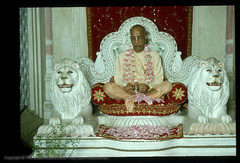“sā tv asmin parama-prema-rūpā”
(Devotional service manifests as the most elevated, pure love for God.
(Sri Narada Bhakti Sutra).
“amṛta-svarūpā ca”
This pure love for God is eternal.
(Sri Narada Bhakti Sutra).
“yat prāpya na kiñcid vāñchati na śocati na dveṣṭi na ramate notsāhī bhavati”
A person engaged in such pure devotional service neither desires anything for sense gratification, nor laments for any loss, nor hates anything, nor enjoys anything on his personal account, nor becomes very enthusiastic in material activity.
(Sri Narada Bhakti Sutra).
“yaj jñātvā matto bhavati stabdho bhavaty ātmārāmo bhavati”
One who understands perfectly the process of devotional service in love of Godhead becomes intoxicated in its discharge. Sometimes he becomes stunned in ecstasy and thus enjoys his whole self, being engaged in the service of the Supreme Self.
(Sri Narada Bhakti Sutra).
A person engaged in the devotional service of the Lord in full Kṛṣṇa consciousness automatically becomes carried away by ecstasy when he chants and hears the holy name of Kṛṣṇa. His heart becomes slackened while chanting the holy name, he becomes almost like a madman, and he does not care for any outward social conventions. Thus sometimes he laughs, sometimes he weeps, sometimes he cries out very loudly, sometimes he sings, and sometimes he dances and forgets himself.
These are the signs of becoming intoxicated in devotional service. This stage, called the ātmārāma stage, is possible when the Lord bestows His mercy upon a devotee for his advanced devotional activity. It is the highest perfectional stage because one cannot reach it unless one has attained pure love of God.
“loke ‘pi bhagavad-guṇa-śravaṇa-kīrtanāt”
One achieves bhakti by hearing and chanting about the Supreme Lord’s special qualities, even while engaged in the ordinary activities of life in this world. (Sri Narada Bhakti Sutra).
Understanding the awkward position of people in the Kali-yuga, the Supreme Lord has given us the chanting of the holy names as the yuga-dharma, the religion of the age:
harer nāma harer nāma harer nāmaiva kevalam
kalau nāsty eva nāsty eva nāsty eva gatir anyathā
(CC:Adi 17.21).
“In this age of quarrel and hypocrisy, the only means of deliverance is the chanting of the holy names of the Lord. There is no other way. There is no other way. There is no other way” (Bṛhan-nāradīya Purāṇa).
“mukhyatas tu mahat-kṛpayaiva bhagavat-kṛpā-leśād vā”
Primarily, however, one develops bhakti by the mercy of great souls, or by a small drop of the Lord’s mercy.
(Sri Narada Bhakti Sutra).
“mahat-sańgas tu durlabho ‘gamyo ‘moghaś ca”
The association of great souls is rarely obtained, difficult to understand, and infallible.
(Sri Narada Bhakti Sutra).
“labhyate ‘pi tat-kṛpayaiva”
The association of great souls can be attained — but only by the Lord’s mercy.
(Sri Narada Bhakti Sutra).
“na dhanaḿ na janaḿ na sundarīḿ
kavitāḿ vā jagad-īśa kāmaye
mama janmani janmanīśvare
bhavatād bhaktir ahaitukī tvayi”
“O almighty Lord, I have no desire to accumulate wealth, nor do I desire beautiful women, nor do I want any number of followers. I only want Your causeless devotional service, birth after birth.” (Sri Shikshashtaka).
“anyasmāt saulabhyaḿ bhaktau”
Success is easier to attain by devotional service than by any other process.
(Sri Narada Bhakti Sutra).
“pramāṇāntarasyānapekṣatvāt svayaḿ pramāṇatvāt”
The reason devotional service is the easiest of all spiritual processes is that it does not depend on any other authority for its validity, being itself the standard of authority. (Sri Narada Bhakti Sutra).
“śānti-rūpāt paramānanda-rūpāc ca”
Furthermore, bhakti is the embodiment of peace and supreme ecstasy.
(Sri Narada Bhakti Sutra).
“tri-satyasya bhaktir eva garīyasī bhaktir eva garīyasī”
Devotional service is the most precious possession of a person who honestly uses his mind, body, and words.
(Sri Narada Bhakti Sutra).
“prabhu kahe, — “kon vidyā vidyā-madhye sāra?”
rāya kahe, — “kṛṣṇa-bhakti vinā vidyā nāhi āra”
On one occasion the Lord inquired, “Of all types of education, which is the most important?”
Rāmānanda Rāya replied, “No education is important other than the transcendental devotional service of Kṛṣṇa.”
(CC:2:8:245).
Related articles
- B H A K T I (Devotional Service). part 1. (acyutaasrayah.wordpress.com)









You must be logged in to post a comment.